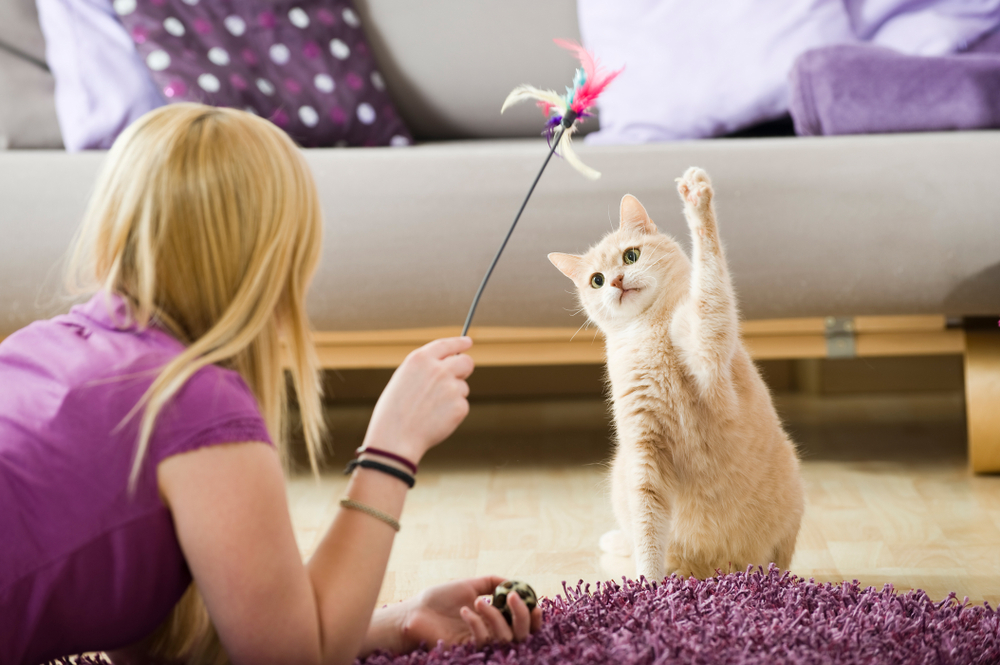As the lazy days of summer wind down, the new backpacks and school clothes come out. Back-to-school schedules have everyone spinning. This year, many households face bigger adjustments than ever as schools hover between virtual and traditional classes. The caring veterinary professionals at Chatham Animal Clinic want your pet to keep a steady schedule, adjust well to the changes, and avoid separation anxiety.
Keep a steady pet care schedule
Pets are creatures of habit who like a steady routine. With so many changes this time of year, ensure your pet’s basic care remains the same. Strive to keep meals, walks, play, and bedtime consistent during the back-to-school period. Dogs and cats can’t thrive unless their essentials are reliably provided.
Delegate pet chores
All family members have more to do this fall, so ensure that a designated person is responsible for specific pet care actions. If your child fed the pets each summer morning, designate another family member for the fall. Start these adjustments before the first day of school, to avoid too many changes at once.
Adjust to busier traffic
When school starts, many neighborhoods will see increased walkers, bike riders, and car traffic. Some dogs have a strong reaction to large vehicles, so before school starts, walk your pet in busier areas, and expose them to school buses. These activities may decrease your pet’s sensitivity, and alert you to potential pet challenges.
Avoid pet anxiety
Pets are social beings. When their family leaves for school and work, most pets will miss the company, but some pets’ reactions escalate into separation anxiety. As much as possible, make gradual, rather than sudden changes, to detect early signs of separation anxiety and keep the problem from worsening. For example, leave for short periods of time before the first school day, and watch for signs of problems, such as pools of drool or urine, excessive vocalization, and destructive behavior.

- Prepare your pet — To help prevent and treat separation anxiety, keep your pet’s environment as predictable as possible, so they will feel secure amid the back-to-school changes. Keep departure and arrival times low-key, and avoid actions that trigger pet fear (e.g., pick up the car keys quietly). Leave unwashed clothing articles for your pet. If certain actions trigger your pet’s anxiety, “uncouple” these cues. For example, pick up your car keys at other times of the day when you are not leaving, and reward calm responses to triggers. Kids should only briefly acknowledge their pet when they get home from school, and interact more after the pet settles down.
- Prevent boredom — Enrich your pet’s home environment, to help them cope when everyone is gone. Food puzzles occupy pets and alleviate boredom while family members are gone. Try several to find your pet’s favorites, and rotate among the options, such as a Kong with frozen peanut butter, a treat-dropping ball, or a home-made treat maze. Hiding several treat puzzles around the house gives pets “work” to do throughout the day—cats can “hunt” treats and dogs can “retrieve” them.
- Calm your pet — Other environmental enrichment ideas that may help your pet adjust to being home alone include calming music and colors. Leaving the radio on helps some pets, but assess your pet’s response, since hearing human voices makes some pets more anxious. A dog who is crate-trained has a small, safe retreat to turn to when they are anxious. Be aware of individual pet preferences, however, as crates increase some pets’ anxiety.
- Consider company — Consider hiring a pet sitter to visit your pets during the school day, but keep in mind that some pets feel worse when the pet sitter leaves. Consider installing a doggie or kitty door. Clean any house-soiling accidents with an enzymatic odor eliminator, since other cleansers merely cover rather than remove scents, which encourages pets to soil the area again. Above all, ensure all family members know that punishing pets for accidents only worsens their anxiety.
- Ask about medication — If environmental modifications are not enough to help your anxious pet, we may prescribe nutritional supplements, pheromone sprays, and/or anti-anxiety medications. The Fear-Free Happy Homes website has many educational videos to help families avoid pet separation anxiety when school starts, and pets spend more time home alone.
Bring your pet concerns to the professionals at Chatham Animal Clinic when school begins this fall. Our experience and expertise can guide you and your pet through any back-to-school problems—especially the most common complaint we hear—“The dog ate my homework.”







Leave A Comment